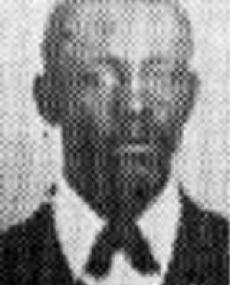
Thomas Mtobi Mapikela (1869-1945) Image source
Thomas Mtobi Mapikela born in 12th of November 1869,in the Eastern Cape, he trained as a carpenter in Grahamstown and later established a successful business as a builder and contractor in Bloemfontein.In 1892 he moved to Bloemfontein where eventually he became a wealthy builder and contractor as well as a key figure in Orange River Colony Native Vigilance Association,known subsequently as the ORC Native Congress.
In February 1909 he was a member of the delegation to Britain to protest the Act of Union. As president of the Orange Free State Native Congress, he played a prominent role in the founding of the African National Congress (ANC) in 1912, and its official speaker for over 25 years Brought up speaking Xhosa and English, he also learned the Sotho and Tswana languages of his adopted Bloemfontein and was thus a natural choice to preside at ANC conferences.The South African Native National Congress (SANNC) was lauched in January 1912,Mapikela who was secretary general of the OFSNCwas elected national deputy treasurer and also designated as speaker,in part a tribute to his mastery of Sotho and Tswana in addition to Xhosa and English which he had grown up speaking in the Cape.
In May 1914 he again travelled to Britain as a member of the deputation protesting the 1913 Land Act. Head of the Bloemfontein advisory board from its establishment in the 1920s, he was for 13 years the treasurer of the South African Location Advisory Boards Congress. In the 1920s and 1930s he served on the executive committees of both the ANC and the All African Convention, and from 1937 to his death in 1945 he represented the urban areas of the Transvaal and Orange Free State in the Natives' Representative Council. He helped draft the ANC's 1919 constitution and also the 1943 Africans' Claims.In the 1930s he was the government-appointed headman of Bloemfontein's township, a position that no doubt helped him acquire contracts for his business. From 1937 to 1942 he was an elected member of the Natives Representative Council for the urban areas of the Transvaal and Orange Free State.